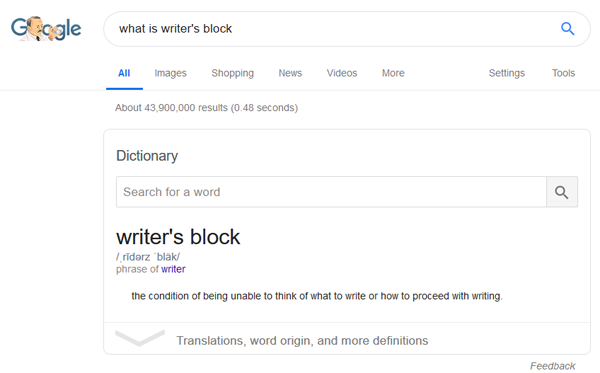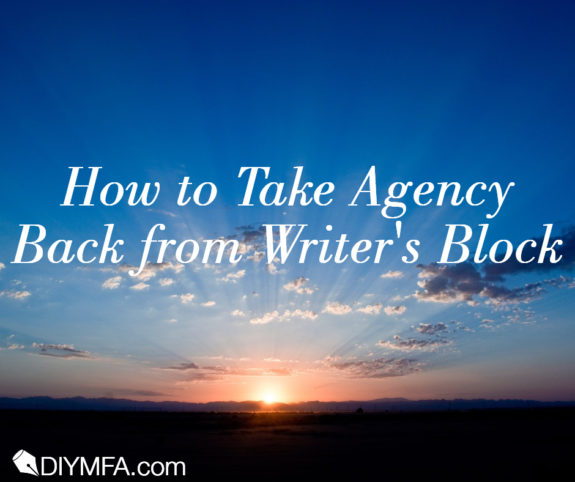I’ve been writing my whole life. Writing is such a part of my life that it didn’t occur to me until I was in my early teens that other people didn’t write as much as I did. Despite this lifelong journey as a writer, I still have times when I encounter what is commonly referred to as writer’s block, but I have learned how to not let it stop me. The secret is to take your agency back from writer’s block, and I’ll show you how.
What is Writer’s Block?

Thank you, Google. According to Google and its 43.9 million results, writer’s block is “the condition of being unable to think of what to write or how to proceed with writing.” Sounds pretty scary. A “condition”. The good news is that since a lot of people seem to have/get it, there are a plethora of articles telling you how to get over writer’s block, beat it or overcome it, etc. That’s awesome.
Now if you look a bit more into writer’s block, you may have noticed there is an opinion that writer’s block is actually not a thing. That “writer’s block” is just an excuse for not writing and that you need to put your butt in the chair and power through in order to beat it.
Whether you subscribe to either of those theories, the truth is that you’re here, reading this article, so I’ll guess you’re suffering from writer’s block. Even if you’re not, you might be worried that one day you will have to deal with it. Either way, let me introduce you to:
My Theory on Writer’s Block
My theory is a bit different. Are you ready for it?
Writer’s block is real, when you make it real.
I say writer’s block only exists inside your head. But, to quote a very wise man:
“Of course it is happening inside your head, Harry, but why on earth should that mean that it is not real?” —Dumbledore
Here’s the thing. Writing is hard. That is just the truth. But for some reason, people don’t think it is, or that it should be. So when a writer has difficulty writing, people’s default reaction is often to assume it is “writer’s block”. And as soon as you think or say, “I have writer’s block,” you have, in that moment, created writer’s block for yourself.
Okay, you may be thinking, So you just said writer’s block is real just like Google.
No, I said: “Writer’s block is real, when you make it real.” And that in itself is a huge distinction. Because it means the ability to write is entirely under your control. If you don’t believe that writer’s block is something you can just create in your head…then what exactly are the stories and characters you’re writing? None of what you imagine is real until you make it real with words, whether thought, spoken, or written. It’s the same with writer’s block.
So I just have to power through?
No, no. Because the very idea that you need to “power through it” means that there’s something there to power through in the first place. When you label your difficulty writing as “writer’s block”, you are labeling it with a definition that has been created by theories, expectations, opinions, experiences, and stories, all wrapped up in society’s agreement reality of what those two words mean together. Writer’s block has been turned into a “condition” or a “thing” by every person to ever have come into contact with that phrase. This means you think (subconsciously) there is nothing you can do in order to get over your writer’s block, and thus you wait for it to end.
Fine, if it’s not real, then why can’t I write?
Because writers tend to say: “I have writer’s block.” Which means, by society’s definition, that they can’t write. This becomes their reality by thinking or saying it and that phrase gives up all agency to the writer’s block. The problem isn’t writer’s block, it’s what we create it to be. What we want to say is: “Oh, I’m stuck on my novel/project, what do I do to get unstuck?” See the difference? With the second statement you’re actively looking for a solution, actively looking for the next step to continue writing.
How to Take Back Your Agency
The first thing to remind yourself whenever you get stuck is that having difficulty writing is normal and it happens to every writer regularly. (Yes, even those amazing bestselling authors you admire.) The second thing is there is nothing keeping you from writing except for you*. Which means you have the ability to end your writer’s block. It’s not always quick, nor easy, but it is always possible.
You simply need to take action and not wait around until “it feels right” or “the muse descends” or “faeries come in the night and write it for you.” The good news is that you probably already have a lot of ways to get around a stuck spot in your writing, you just might not be aware of them.
One option is to write more words, but don’t think of this as “powering through.” It doesn’t have to be painful. Think of it more like “searching” through all the wrong words until you find the right ones.
You could try having a conversation with your character or writing a scene from a different character’s pov. If you’re more of an outliner (someone who plans their novel before writing), write a new outline and see if that one takes you somewhere else. Try reading some writing articles or listening to writing podcasts, or find inspiration in other art and/or the world around you.
And remember, the first thing you try might not work. Or the second. I’ve had to go through half a dozen action steps and several days or more on occasion before I found the thing that broke through some of my more intense stuck spots. But I’ve always found a way to fix it; every single time. Even when that action ended up being setting an entire novel aside and starting a new one.
The key is to take action, whatever that action might be, have faith that you will figure out that stuck spot eventually, and you will be a better writer for the experience.
An aside
*This is an important aside because there are times when an inability to write is not about the writing at all, it’s depression, and that is NOT something you can just action your way through. I have depression and I have put a lot (like a lot) of time and effort into learning how to work with it. If you think you might have depression, please talk with a doctor, because you don’t have to live with it.

Laura Highcove has a degree in computer science, which is obviously why she is a fantasy writer. She is influenced by anime, video games, table-top gaming, programming, horses, and Norse mythology in no particular order. She currently lives in beautiful Blacksburg, Virginia with her computer, two cats, and husband. Her psychic abilities have not yet developed, but she remains hopeful. If you’d like to learn more about her, you can check out her website at www.laurahighcove.com and sign up for her newsletter (and get a free short story!).







